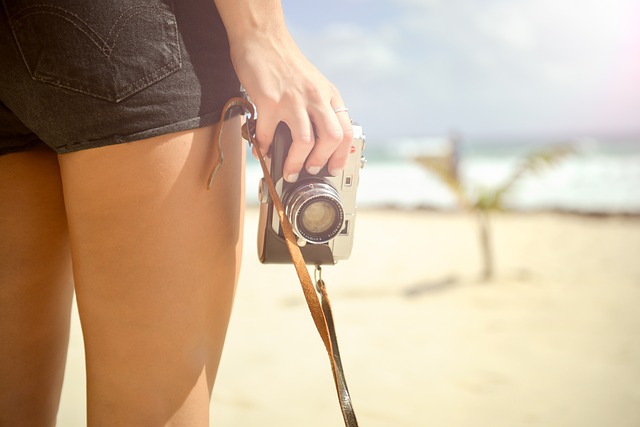Many people find entering the nuances of photography to be very intimidating. This is generally because such people are not knowledgeable of where to find useful advice on the subject. The tips and tricks you will read in this article will show you do things you never even dreamed of!Be picky about what will end up in the picture. Great pictures are like tiny windows highlighting specific things about your subject. Avoid trying to get too many things within the frame. To create a general impression of an object, shoot a series of photos, instead of a single detail oriented photo.Get close to get the most impressive shot. This will help you frame your subject, so that the focus is on your subject.Test varying shutter speeds to learn which speed works best for certain scenarios. By varying shutter speeds, you can capture stills as well as fast moving objects. Traditionally, fast shutter speed is used for motion while a slower speed is used for still scenes.Keep things simple when you are trying for a great shot. You can usually take a great picture without playing around with advanced settings.Keep your technique simple to get the best pictures. Often, you can create a magnificent photo without having to play with different color settings and motion settings.A dSLR is crucial if you’re aiming to be serious about your photography. This type of digital camera can help you the subject when you take the picture. For the most detailed pictures and largest image sensors, a full frame digital single lens reflex camera is the best choice.You should try to stay away from an overcast sky when taking pictures. An expanse of gray sky in your images will give them a dull, pallid appearance. If you find yourself shooting into overcast skies, taking classic, black and white photos may be your best option. On a beautiful day, you can include as much blue sky as you desire.One effective way to improve your photography skills is to draw inspiration by studying the work of other photographers. When you see the work of photographers you admire, you will be able to see many different ways to capture an image.For professional photos, get a professional camera. A professional grade camera will give your photographs a more professional finish. This is what many professionals use, so if you want photos that look like theirs, you will need the same type of camera.Choose only your best photos to showcase or display.Don’t show too many photos and vary the exact same subject.It can be very boring for others to see the same thing over and over again. Keep what you show other people fresh and exciting by showing many different types of shots.You should create depth and perspective when photographing landscapes. When you place familiar objects in the foreground of the image, you can help viewers to perceive the size and scope of the subject. A small aperture–no more than f/8 on a digital camera and no more than f/16 on a SLR–can show sharpness in both the background and foreground.When you have your shot lined up and it is time to hit the shutter button, stay still and hold your breath when you push the shutter. Even minimal movement can destroy that perfect shot.Tinker with your cameras manual white balance. Often, incandescent bulbs commonly found in homes and businesses result in a yellow tinge to photographs taken indoors. Instead of altering the lights in the room, try playing with the white balance for a new atmosphere. This will definitely provide your pictures with a professional appearance.Consider becoming a member of a photography group, or simply going out and taking some pictures with a fellow photographer. You can learn from others and pick up new ideas, as long as you don’t allow their style to influence your work. Compare the pictures you took of the same object.Experiment with your camera’s various features, along with angles and colors. A high quality photograph does not require an original subject. It just requires an original way of thinking. When a great photographer combines their skill level and artistic eye, they can make even the most boring object look fascinating. Experiment with different techniques to develop your own style.After getting the film developed, consider having prints made onto a variety of papers, like fiber papers.Use care when packing your photography equipment in trip preparation. Pack however many lenses you anticipate using, and don’t neglect to throw in cleaning accessories and backup batteries. Don’t take more with you than you absolutely need.Another interesting look is to ask the subject to look at another person in the frame.
Photography is about having fun and expressing yourself. A picture is a way of recalling a certain situation or emotion. If taking pictures is fun, you’ll be more excited to learn new skills.Shoot fast when you are taking photos. You never know how fast that perfect moment will leave you, so always be ready for it. Animals will move, people will not want to smile as long, or that perfect candid moment will be lost. Don’t worry about correctly using every setting on the settings if it means risking losing a good shot.When shooting a subject, zoom in so that they fill the whole viewfinder. Photos taken from far away don’t tend to be all that interesting because details or colors are too small to see. By getting close, you afford your viewers a clear, detailed view of your subject.
Practice Shots
Digital cameras normally contain a built-in flash, that automatically turns on when the natural light is too low. The convenience of this feature can be great for quick candid shots; however, if your goal is more professional shots, weigh options for the purchase of an external flash option. This will allow greater diversity in your lighting needs. Check to make sure your camera has a “hot shoe” on top that will accommodate an external flash, then go to a professional camera store to ensure that you are getting one that automatically syncs with your camera.Take a lot of practice shots when you are working with a new subject or background. Every photographing situation can vary widely, so it is important that you take practice shots to get used to the setting. Try taking practice pictures at different times of the day to get a different lighting.Take a deep breath, and try to remain as still as possible when pressing the shutter button. Alternatively, use a tripod and/or a shutter release cable. You could ruin your shot by accidentally moving. Take that second to freeze before touching your shutter button, hold your breath, and snap the perfect shot.Experiment with different angles and heights to add visual interest to your pictures. Anyone can take a head on photo of a scene head-on. Look at things from a different perspective, or look up at something to get an interesting perspective.You could also find that angled or side shots create a distinctive photographic experience.It’s important to keep on top of natural lighting. The ideal lighting for outside photos is provided by the sun when it is low on the horizon. Avoid casting shadows that may darken your photographs. Use sunlight to its best effect by positioning yourself so that the subject is hit by the sun from the side.You can easily edit your own photo editing! There are a ton of different editing software programs available on the market today. Choose a package that is packed with features and allows you a great deal of freedom in editing your photographs. Make sure to find a program that it is simple to use.Watch for any patterns, natural or artificial, you may see when you’re shooting your subject. Patterns give your photo increased visual interest, particularly if they repeat. You can even use them to your advantage to create some interesting angles and backgrounds for your subject matter.You can adjust the settings on your camera before taking a picture, by photographing it from different angles or using different camera features. Experiment with these techniques beforehand so you’ll be able to visualize how they’ll affect the shot.Try having borders on each of your pictures, even if they are natural. This refers not to a physical frame around a printed photo, but to a “natural” frame sought out in the camera’s field of view. If you look hard enough when trying to take a picture, you can use neighboring elements to create “natural frames” for your subject matter. This can be a wonderful way to compose your shots.To add extra appeal to the photo, add something interesting to the foreground in your landscape photos.Images can be taken in many angles, not only horizontal. Sometimes, the most striking photographs come when you turn the camera to capture a vertical shot. Use the zoom feature, as needed, to get full effects of an up-close shot. Conversely, zoom out if you desire to get head-to-toe shots of people.When you work with objects that move quickly, make sure you have the right settings in place on your camera, so that your pictures are not just blurs. This will get you better and clearer shots of fast moving subjects.You should try using ordinary things when trying to get inspiration. Try taking some shots of common, everyday items. Using everyday items, such as your cooking utensils or children’s toys, could be experimented with artistically through form and composition. The end product is entirely in your hands. Make it a challenge to turn something from ordinary into interesting.As mentioned at the start of this article, many people don’t understand what photography is all about. Learning more about the subject boosts their confidence and makes photography more enjoyable. Use the guidelines this article has given to you, use your camera and start taking photos.Use a cropping program to make your pictures better. Sometimes you think your picture is great – except that sock in the background. Perhaps your subject is perfectly clear but far too close to the edge of the frame. These issues are easily remedied by clever cropping later.

